
SHINKO ELECTRIC INDUSTRIES CO., LTD.

SHINKO ELECTRIC INDUSTRIES CO., LTD.
Halting and reversing the urgent global issue of biodiversity loss is an important challenge for our company's sustainability, as our business activities both benefit from and impact the bounty of biodiversity.
The Shinko Group has the Environmental Policy to contribute to the creation of an abundant society through countermeasures for climate change, effective utilization of resources and conservation of biodiversity, and have established medium- to long-term environmental targets for biodiversity conservation. We are working toward nature positivity and the realization of a society living in harmony with nature by driving efforts to conserve biodiversity and reduce negative impacts on ecosystems in our business activities.
 Conservation of Biodiversity
Conservation of BiodiversityIn light of Shinko Group's dependence on and impact on biodiversity, it aims to conserve biodiversity, which is the foundation of a sustainable and prosperous society, and it has established the Guiding Principles for Biodiversity in accordance with its Environmental Policy to collaborate with society in pursuing the ideal way for people to live in harmony with nature.
Guiding Principles for Biodiversity
- Practice conservation and sustainable use of biodiversity in our business activities.
- Contribute to creating a society that can achieve biodiversity conservation.
- Human resource development through biodiversity conservation.
Key risks and opportunities related to biodiversity
In order to assess the impact of our business activities on biodiversity, the Shinko Group has conducted biodiversity risk assessments, including physical and reputational risks, at our domestic and overseas production sites, using the World Wildlife Fund (WWF) Biodiversity Risk Filter.
As a result of the assessment, it was confirmed that none of our production sites have levels of physical risk or reputational risk that are High or Very High.
We also use the Integrated Biodiversity Assessment Tool (IBAT) to identify nature conservation areas1 within a three-kilometer radius of the Shinko Group production sites. Based on these findings, we have begun examining what actions are necessary. We also conduct water risk and water stress assessments, recognizing their necessity not only from a water resource protection perspective but also from a biodiversity conservation standpoint.
> Resource Circulation / Reducing Water Use / Identifying Water Risks at Manufacturing Sites
We will continue engaging in activities that aim to reduce the negative impact of business activities on the ecosystem and help to realize a society in harmony with nature.
1 Protected areas: Areas essential for biodiversity conservation and serving as an assessment indicator of IBAT, including: categories Ia, - III in IUCN Management, Ramsar Convention Wetlands, UNESCO Parks, Alliance for Zero Extinction Sites, and KBAs (Key Biodiversity Areas).
Assessment of Biodiversity Risk at Production Sites2 (FY2024)
2 Production sites
[Japan]
Kohoku Plant, Wakaho Plant, Chikuma Plant, Takaoka Plant, Arai Plant and Kyogase Plant
[Asia]
KOREA SHINKO MICROELECTRONICS CO., LTD.(KSM)
SHINKO ELECTRONICS (MALAYSIA) SDN. BHD.(SEM)
3 WWF Biodiversity Risk Filter Criteria
4 WWF Risk Type "Scape Physical Risk"
5 WWF Risk Type "Scape Reputational Risk"

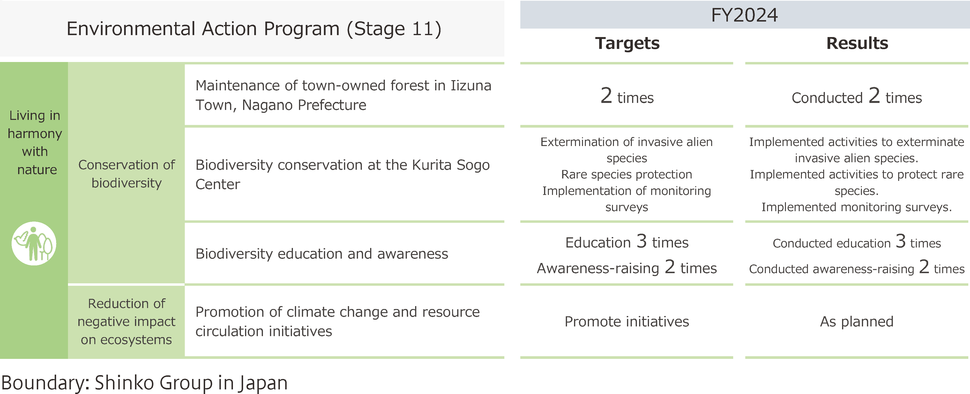
Biodiversity conservation activities of Shinko Group in Japan were launched in FY2020 based on three plans: "Adopt-a-forest program in Nagano Prefecture," "Engage in biodiversity conservation activities in the Kurita Sogo Center," and "Conduct environmental education and awareness activities to foster consciousness of biodiversity." In FY2021, these activities were established as medium- to-long-term environmental targets and have been progressing as planned through FY2024.
As activities toward achieving a nature-positive world gain momentum globally, our Company will also strive to further advance our efforts in biodiversity conservation.
Reporting boundary: Shinko Group in Japan

Shinko and SHINKO WORKERS UNION participate in the adopt-a-forest program promoted by Nagano Prefecture. Every year, employees and their families participate in forest maintenance work in the area around Lake Reisenji, which is owned by Iizuna Town.
In FY2024, we implemented the target of “Maintenance of town-owned forest: 2 times per year” as planned.
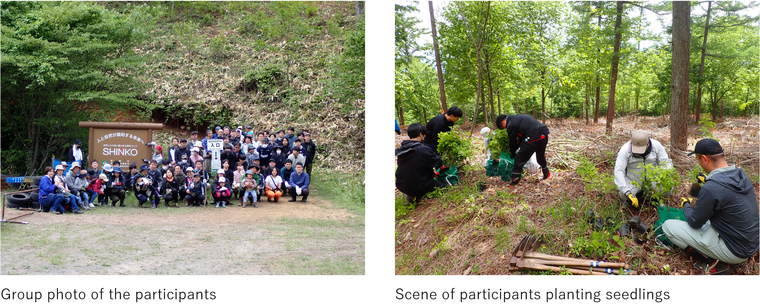
In the areas we have worked on to date, we are seeing trees growing steadily.
To objectively assess the effectiveness of these activities, we have received certification under the Nagano Prefecture Forest CO2 Absorption Assessment Certification System since FY2021.
Certified amount of CO2 absorbed, and area maintained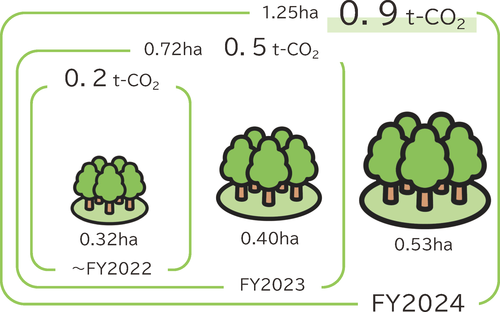
Through these activities, we will strive to continue and contribute to biodiversity conservation activities in cooperation with local communities.

The Kurita Sogo Center, located near Nagano Station, spreads out like an oasis in an urban area. Here, Shinko continually conducts natural environment surveys.
In FY 2024, we implemented our planned activities and achieved our targets of extermination of invasive alien species, rare species protection and implementation of monitoring surveys.
In the natural environment survey conducted in FY2024, 151 species of plants, 69 species of terrestrial insects, and 23 species of aquatic organisms were found to inhabit the area, many of which were confirmed to be native species. However, a small number of alien species that threaten the ecosystem of the Kurita Sogo Center and the surrounding area were also found. We are exterminating and monitoring them as indicator species. We will continue our activities to improve biodiversity at the Kurita Sogo Center.
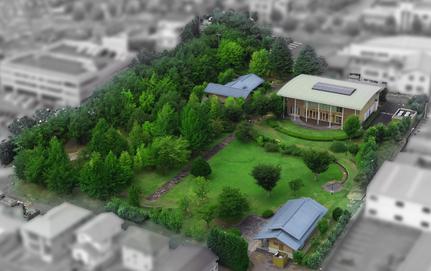
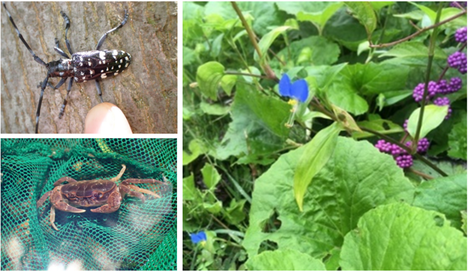
Kurita Sogo Center (Nagano City) and the Creatures that Live There

Shinko Group in Japan implements education and awareness activities to ensure each employee understands the importance of biodiversity and the relationship between biodiversity and business activities, enabling them to take actions that incorporate a biodiversity perspective in their work and daily lives.
In FY 2024, we implemented our planned activities and achieved our targets of conducting of 3 times education and 2 times awareness-raising.
We will continue to educate and raise awareness about biodiversity to deepen understanding and translate it into action.